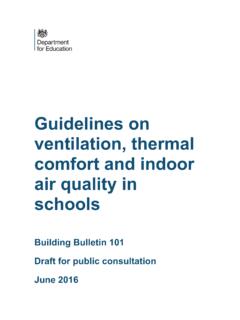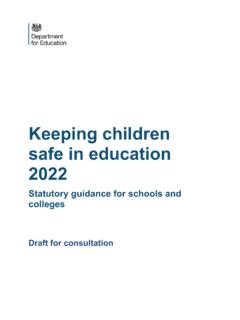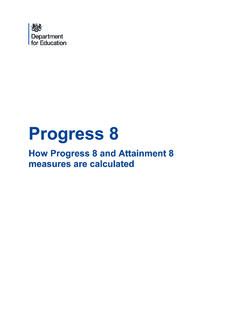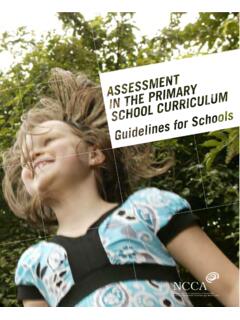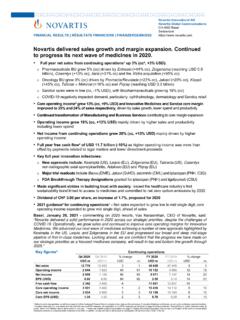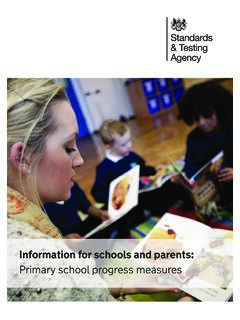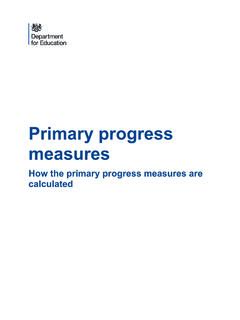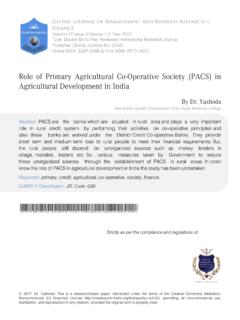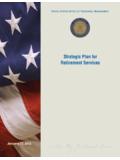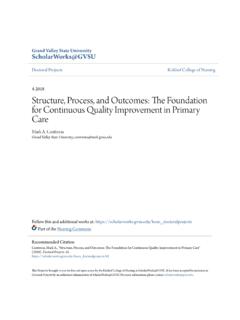Transcription of Primary assessment in England - Department for Education
1 Primary assessment in England Government consultation Launch date 30 March 2017 Respond by 22 June 2017 2 Contents Ministerial foreword 4 Introduction 6 Who this is for 6 Issue date 6 Deadline 6 Enquiries 7 Additional copies 7 The response 7 Respond online 7 Other ways to respond 7 1. Current system: statutory assessment in key stages 1 and 2 8 Context 8 Principles 9 Purposes 9 Current system 9 2. Preparing children to succeed at school 11 Assessing a child s development and readiness for school 11 The early years foundation stage and profile 11 Workload 13 Moderation 13 3. The best starting point for measuring progress in Primary school 15 Option 1: Capture more progress through the Primary phase by moving the starting point for measuring progress to the reception year 15 Option 2: An improved key stage 1 baseline 17 Interim years 18 The role of key stage 1 statutory assessments 20 Monitoring national standards at key stage 1 21 School types and assessment 21 4.
2 A proportionate assessment system 23 Collection of teacher assessment data at the end of key stage 2 23 3 Key stage 1 English grammar, punctuation and spelling test 24 Multiplication tables check 24 Reducing burdens within the Primary assessment system 25 5. Improving end-of-key stage statutory teacher assessment 26 End-of-key stage statutory teacher assessment 26 Teacher assessment of English writing 27 Supporting and strengthening the assessment of English writing 28 Alternative approaches to moderation 28 Equalities 29 4 Ministerial foreword This government is dedicated to making Britain a country that works for everyone, not just the privileged few. It is hard to overstate how important Primary Education is in this commitment to social mobility.
3 Teachers and school leaders have a fundamental role to play so that every child can fulfil their potential. Acquiring a good grasp of the basics of English and mathematics, as part of a rich and varied curriculum, is critical for a child s future success. There has been a lot of change in Primary schools in recent years, as we have worked together to raise standards, and I recognise that teachers and headteachers are still adapting to these changes. The new national curriculum, taught since 2014, has led to new assessments and a shift in expectations for all children. Teachers and pupils have responded to this challenge. Last October, recognising concerns around the current system, I announced a series of steps to provide greater stability and set direction for the long-term system of Primary assessment .
4 I outlined some immediate measures, including a commitment that there would be no new national tests or assessments introduced before the 2018 to 2019 academic year. I also announced that the key stage 1 English grammar, punctuation and spelling test would remain optional for schools in the current academic year, and that we would not introduce statutory mathematics and English reading resits in year 7. We have also considered how this year s test experience could be improved for pupils and have taken steps to ensure this. In addition, I promised this full public consultation to help us to set out a longer-term, stable and sustainable approach to assessment .
5 While the short-term measures are important and have helped address some immediate concerns, it is vital that we build on recent steps and establish a settled, trusted Primary assessment system. In this consultation, I set out my long-term vision for Primary assessment and invite views on the proposals that it contains. This includes critical issues such as the role and operation of teacher assessment and the best starting point for measuring children s progress during Primary school, issues recently considered by the independent assessment review group convened by the National Association of Head Teachers. It is important that we have a proper, considered debate around these proposals so that we can move forwards to a stable, trusted Primary assessment system which delivers strong educational outcomes for all children, regardless of their background, ability or any additional needs they may have.
6 I want a system that measures the progress that children make throughout their time at Primary school fairly and accurately, a system that recognises teachers professionalism in assessing their pupils, and a system which does not impose a disproportionate burden. 5 It is vital that we also have a fair and effective assessment system for pupils working below the standard of national curriculum tests; statutory assessment arrangements for these pupils are considered in the parallel consultation on the recommendations made by the independent Rochford Review. I want as many people as possible with an interest in the future of Primary Education to participate in these consultation exercises and to share their thoughts.
7 In particular, I want to hear the views of teachers and headteachers and to draw on their expertise and experience to continue to improve the way that we assess the attainment and progress of children during their time at Primary school. Rt. Hon Justine Greening MP 6 Introduction This consultation is about the approach taken to Primary assessment in England . Through this consultation, we will work to establish a settled, trusted Primary assessment system, designed to support strong educational outcomes for all children. We will continue to work closely with the sector as we move towards this goal in the years ahead. This consultation is mainly concerned with statutory assessment by which we mean the summative assessment , required by the government, which takes place at the end of a period of study, either through externally-set tests, or through teacher assessment .
8 There are currently statutory assessments at the end of reception, key stage 1 and key stage 2. There is also a statutory phonics screening check in year 1. This consultation touches indirectly on the ongoing, formative assessment that is a key component of good teaching and goes on in the classroom all the time, but we see this as part of teachers own pedagogical approach and something that government should support but not prescribe. assessment arrangements for pupils working below the standard of national curriculum tests are considered in parallel in the separate consultation document on the recommendations made by the independent Rochford Review. We are clear that all areas considered across both consultation documents must work for all pupils, including pupils with special educational needs and disabilities (SEND).
9 Who this is for This consultation is for anybody with an interest in the early years, Primary Education and the way that pupils are assessed in school. This includes: schools and school leaders, and organisations representing school leaders teachers and organisations representing school teachers governors and organisations representing governors early years providers and organisations representing them parents, carers and young people and organisations representing them organisations representing those with special educational needs and disabilities (SEND) local authorities other government bodies and departments Issue date The consultation was issued on 30 March 2017.
10 Deadline The consultation closes at 5pm on 22 June 2017. 7 Enquiries If your enquiry is related to the policy content of the consultation you can contact the Department on 0370 000 2288 or e-mail: If your enquiry is related to the DfE e-consultation website or the consultation process in general, you can contact the DfE Ministerial and Public Communications Division by email: or by telephone: 0370 000 2288 or via the DfE Contact us page. Additional copies Additional copies are available electronically and can be downloaded from DfE consultations. The response The results of the consultation and the Department 's response will be published on in September 2017.

